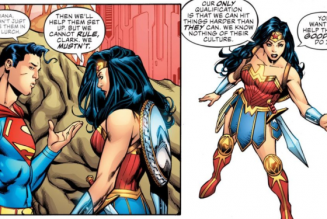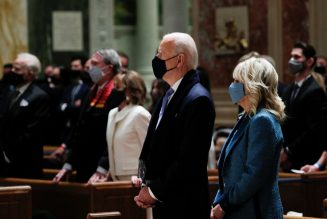By Dr. Jeff Mirus ( bio – articles – email ) | Jun 21, 2022
Sadly for Catholics today, most of us have friends or family members who have chosen to leave the Catholic Church and worship instead at a Protestant church of some sort, or no church at all. By far the most common cause of this is marriage issues. Catholics may marry outside the Church to escape a failed marriage which has not been annulled, and so they need either a “Christian” church which permits divorce, or a Justice of the Peace. Alternatively, a Catholic who marries a non-Catholic may think it important to worship together as a family, but finds that this must be done at the non-Catholic’s church because the non-Catholic is not willing to worship as a Catholic.
Alternatively, the cause could be moral, as someone who has been raised a Catholic may switch to a church (or simply a wayward Catholic parish) which upholds the goodness of moral behavior that is contrary to the teachings of Christ. Or some may gradually drift away from the practice of the faith in general accordance with the attitudes of our dominant secular culture. These and many related situations create continuing problems for all concerned, including other Catholic family members or friends who want to avoid any sort of rift with those who have chosen, in effect, to leave the Catholic Church.
Ideally any Catholic would have such an understanding of and commitment to Christ and His Church that every decision—including decisions regarding marriage and children—would be made in accordance with the teachings of Christ as known through the Church. It may be hard for some of us now to imagine ever putting the cart before the horse, ever allowing our romantic desires—or any form of human love—to eclipse the love and fidelity we owe above all to the very Author of our being. But the sad human reality is that many people make marital and other life-style decisions long before they have come to a mature Catholic Faith. All of us have, at one time or another, been driven by wayward desires and have sinned as a result, either through misunderstanding, lack of reflection, or direct rebellion against God. Therefore, painful as these unfortunate marital and moral situations are, we really should not have a great deal of trouble understanding how people get themselves into them.
The result is that we don’t have to look far to find people we already care deeply about who have fairly persistently refused to come fully into the light of Christ. We no longer live in a broadly Catholic culture, with moral standards that reflect the teachings of the Church and with regular worship and reception of the sacraments. Nor do we live in a culture which “instinctively” accepts the Catholic tradition as the key to a full understanding of life. In recent centuries, many were raised in a nominally Christian way, but only through a social consensus which has been substantially lost.
Therefore we now often assume that everybody is basically “OK”, that these questions are hopelessly confusing, that it doesn’t make much sense to examine them closely, and that the safest course—all things considered—is to stay generally mainstream, perhaps with a vague understanding that God loves us and will sort it all out in the end. There is neither fun nor profit in worrying about it ourselves. It is chilling to note that this is confirmed today not only in the celebration of “Christian” marriages (which often proceed without any real Christian commitment) but also in the celebration of “Christian” funerals (which often consist of vague but rosy Christian reflections relative to deceased persons who consistently refused to have any anything significant to do with Christianity during the course of their lives).
Our rosy reflections on the life of both the future of the newly married and the past of the newly deceased are colored by our convenient human conviction that only a very vicious sort of God could have any objections to the kindly sincerity of those involved. For some reason, we have long since stopped asking whether our newlyweds or our dearly departed have any objection to God. But those of us who do ask this question often participate in both weddings and funerals with a significant measure of discomfort, not to mention later family visits and gatherings, in some cases even wondering whether we should be there at all.
The scandal of Christianity
It used to be, at least at times, that the scandal of Christianity was its life-and-death opposition to the World. It is hard for us to imagine, perhaps, that so many people flocked to the cross in the early centuries despite the threat of persecution and death. Or that so many even in relatively modern times were willing to give up their lives in places as diverse as England, France, Germany, Russia, the Middle East, the Far East, and Africa rather than betray their Christian identity. But as the centuries have rolled by, we Christians have become increasingly creative. While there were always heretical sects, over the centuries we have learned to revel in diversity, happily dividing a spineless Christianity into a plethora of sects, so that no matter what any persons refuse to God, they can find Christian “ministers” to confirm their decisions, and place them in the vanguard of those fighting for a more authentic world.
Consequently, by far the greatest scandal given by Christianity—a scandal that has led over the centuries to our current all-but-hopeless confusion—is the scandal that whenever anyone comes up against a moral or doctrinal wall in the Catholic Church which separates those who are in and those who are out, those who deny the claims of the Church Christ founded can easily simply join a different Christian church (or perhaps even a different parish or diocese) in which that person’s particular refusal to follow Christ is regarded as a positive thing—nay, even a courageous embrace of a new and purified version of the ancient faith!
Don’t like doctrinal and moral authority? Join us and read Scripture for yourselves! Annoyed by demanding sacraments? We are all spiritually equal here! Refuse to be bound by life-long marriage? It was all a mistake, which is why our church permits divorce! Doubting your church because it prohibits things we now know are perfectly normal? Worship at our inclusive church! Yearning to be recognized as the good and perfect person you are? Christ affirms you here! Good news is out; better news is in: Consoling faith without counter-cultural commitments: Christianity Lite.
We have, of course, all but lost the concept of “authority”, the understanding that the “author”—the creator—of something alone fully grasps what it is, and how it is to be understood and “used”. This is one of the great temptations for squeezing God out of our understanding of everything from nature to politics. Simply by refusing to admit the possibility of any clear Revelation, we slip into the habit of assuming first that man is the measure of all things and finally that only I am the measure of all things. The result is not only our contemporary moral chaos, but a re-invention of religious affiliation in accordance not with God’s authority but with our own sovereign whims.
It is not what God thinks of us that matters, but what we think of God! And it is just this that puts serious Catholics in the hot seat: When it comes to the various human milestones, celebrations, seasons and family gatherings, we must choose constantly between being supportive and encouraging on the one hand, and witnessing to the truth on the other.
Spiritual trajectory
Of course, the trajectory we find people on (including ourselves) matters a great deal. This is what makes such things as religious commonalities and ecumenism so tricky for Catholics. A person who is born into some other religion—a religion other than that of the Catholic Church, which alone can show public evidence of its establishment by God Himself—such a person may well be adhering to the clearest and most compelling expression of the Truth he has yet encountered, and this adherence may well be driven by the very best of motives. But the case of the person who starts in the Church and then drifts elsewhere is likely to be very different. Such a person has abandoned Catholicism almost certainly because there is something he or she values more than the will of God. And yet even in cases like this, they may embrace some goods which penetrate over time and lead them back to the source. It is frustratingly difficult to make firm judgments.
Nonetheless, breaches arise typically because of the general lack of seriousness in the reception of the immense gifts the cradle Catholic has received. In huge numbers of cases, the point of departure arrives simply because the person in question chooses not to accept a moral or spiritual restriction on his life which Christ Himself imposes, as known through His Church. The at-risk person does not wish to appear “different” from most other people or from the dominant culture or, more specifically, the person wants to engage in an immoral lifestyle or wishes specifically to change his church affiliation to one compatible with a serious rejection of Catholic moral teaching—usually (today) relating to sexuality or marriage.
No person’s motivation can be assessed perfectly by anyone but God, but even speaking in human terms, we can see that it makes a huge difference spiritually whether one is in a position of gradually embracing as much truth (the mind’s grasp of reality) as one has been able thus far to recognize, or on the reverse trajectory of regressively rejecting every truth that interferes with what he or she wants to think and do right now. At the same time, it is also true that God rather obviously permits a large degree of freedom to his creatures, which means He may permit us to fall into a sort of darkness in which we live in any number of errors without fully realizing what we are doing, and without making any sort of definitive or final decision to reject God.
This in itself can be a temporary blessing. If we add the self-deception of constant rationalization to the mix, we can see how hard it is for us to discern the state of another person’s soul, and therefore to discern whether they need to be met on their own terms, as the expression goes, or immediately challenged with a counter-witness to the Truth. And it is this difficulty which brings us back to the beginning. How are we to act toward those among our friends and relations—perhaps even our brothers and sisters, children or even parents—who have, to satisfy their own wayward desires, repudiated the Catholic Church?
Against the easy way
I am afraid there is nothing easy about this. We must begin by being self-aware enough to know whether for us the “easy way” is simply to put the best possible complexion on things and therefore to avoid challenging those who have gone astray.
I should be frank about this: It is easy for me to make a career of writing more or less clearly about the truth, day after day and year after year, because of the audience I seek to serve. I mean those who are already thirsting for the clarity of the Truth as understood through Jesus Christ and the Church He founded, and who are deeply troubled by the frequency with which these truths are obscured, ignored or denied even by Church leaders, who are too often far more concerned about acceptance by the dominant culture than acceptance by Christ.
But while this is easy for me professionally, it is not the easy way today in general. Obviously it is not the easy way for anyone who wishes to be successful in much bigger and broader “business”. More importantly, neither is it the easy way for those who are called upon to interact with family members, friends and fellow-parishioners who have fallen away from the Church, or who have grown comfortable and even self-righteous in worldly parishes, or who have found ways within the Church to disguise and communicate the falsehoods most favored by our dominant secular culture, or again who have specifically chosen to switch to one of a thousand semi-Christian churches or semi-Christian attitudes which approves the moral errors of our dominant secular culture—representing lifestyles into which our particular family members, friends or acquaintances have fallen.
We must keep in mind that we cannot divide Christ up and take only this or that part of Him to our hearts. To reject any teaching of the Church is to reject Christ the author of reality; to attempt to flee from this or that Christian truth is to attempt to flee from Christ. In these cases, the easy way of affirming and explaining the truth to those who hunger for it, becomes the hard way—the courageous way of stepping out in Faith to try to bring that friend or family member back to Christ. Here we are called upon to refuse to accept the illusion that all is well and very well, when in fact the one we love is experiencing a ravaging spiritual disease which can lead ultimately to spiritual death.
But this way is awkward and uncomfortable. This way requires courage because it entails personal risk. The grave danger is that we will choose what I call “mere accompaniment”, that is, accompaniment without ongoing witness, without doing more than simply pretending to await the perfect opportunity. For accompaniment without courage ignores the reality at the heart of the issue, the truths that have been more-or-less deliberately rejected by the other, and which form the basis of the other’s ongoing spiritual crisis, the other’s eternal danger.
A note on intercommunion
Let me pause here to mention one false step that is far too tempting to those who fear that by their untimely or inept witness to the truth they will deepen the rift. This false step takes affirmation and accompaniment to the point of worshipping with those who have fallen away, receiving communion with them in the church they have chosen, and welcoming them to receive communion in the Catholic Church. This is deeply sinful on two counts. First, at least in Protestant churches, the Eucharist is nothing but bread and wine. There is no priesthood and no transformation of the Eucharist into the Body, Blood, Soul and Divinity of Jesus Christ. Regardless of intention, this is objectively a sacrilegious mimicry of the Catholic representation of Christ’s sacrifice of Himself to the Father, and the sharing of His true Body and Blood to incorporate those who receive into the One Body of Christ.
Regardless of intention, this is a ceremony in which no Catholic can participate without grave sin, allowing an emotional desire for shared symbolism to eclipse Reality itself. Moreover, the Eucharist is specifically the sign of the unity of the Church, and for those who are not in Communion with each other ecclesiastically, it is a betrayal of the Body of Christ to overlook these grave separations and pretend to a communion which does not exist. For this reason, the Catholic Church teaches both that non-Catholics may not morally receive Communion in the Catholic Church (except with professed faith in danger of death) and Catholics may not receive the Protestant bread and cup, in which case they would be witnessing to a both a non-existent Communion and a Christ who is, as a matter of revealed truth, not real and present there. For those who should know better, this is deadly. It is simply a reverse failure to heed St. Paul’s insistence that “any one who eats and drinks without discerning the body eats and drinks judgment upon himself” (1 Cor 11:29).
This practice of “kindly affirmation” or “familial solidarity” which leads Catholics to affirm those who have fallen away through this “ritual kindness” is extraordinarily widespread today. So make a note: This is a bridge too far. This is human emotion and human respect pretending to be the grace of God. We are not to substitute a merely human bond for our free, conscious and real sacramental incorporation into Christ. I cannot put the matter too strongly: While undoubtedly often sincerely mistaken, this obscures rather than clarifies the Reality at stake.
Example, prayer and sacrifice
Our own example is a vital component of effective love. This is so true that when it comes to children who have gone astray, we should look carefully at how we raised them, to see if there is anything which needs correction in our own tangible commitment to Christ and the Church. Nonetheless, we all have free will, and we must persist in our own Catholic growth and continue to bear witness to our deep attachment to Christ and the Church. This is a continuing act of love not only for Christ but for our family. We cannot fuel that love in others if we do not manifest it ourselves. Consequently, we must not, for the sake of comfort, alter our own habitual religious adherence to the truth. This must continue to be manifest in the customs of our home, in our willingness to bear witness to the truth when someone brings up a touchy subject, and (again) in the refusal to compromise our own Catholic worship and sacramental life in the name of a unity which cannot at present exist.
Beyond this, however, things can be very difficult. When a beloved son or daughter, brother, sister, friend, parent or even spouse has fallen away from Christ and the Church, we obviously still love them, and just as obviously we cannot be haranguing them constantly when we have such ample evidence that they are not open to our pleading or our logic. I would argue that we should try to be sensitive to fresh opportunities, but in my own experience, these are very few and far between. It is precisely here that we must realize that the Father, Son and Holy Spirit love our family member or friend far more than we do, and so we are wise to trust in the workings of Divine grace and to seek to maximize the operations of that grace. Our Lord has given us the power to do this through prayer and sacrifice. And yet it has always astonished me how few people seem to have recourse to constant prayer, let alone sacrifice, when they are in one of these situations which makes it difficult to speak effectively.
It will be quite common that, with a certain amount of fear and trembling, we discern there is simply very little that we can any longer say that is likely to be welcomed positively by one who has fallen away. But there can never be any excuse for a failure to pray and sacrifice regularly for a loved one who has gone astray, a beloved lamb which, for whatever reason, has fled into a wilderness which only Christ knows well enough to penetrate. We must never pretend that this lamb has not wandered off or even fled; we must never fall into the trap of assuming that “her heart is in the right place” (it isn’t, it is somewhat displaced), or “he is doing the best he can in the circumstances” (which is not true since repentance can always find a way back). No, something is broken that must be healed, something is empty that must be filled by grace. If we are not the one who can heal, we can at least become an instrument of grace, if only (only!) through constant penance and prayer.
In the end, this will very likely be our most frequent course of action. First of all, if we are not praying constantly, we are doing nothing at all to increase the likelihood that we will respond in God’s way rather than our own weak and self-interested human way, driven by mere affections, or perhaps even self-righteousness. If we do not show even this mercy of prayer and sacrifice, we can hardly expect mercy for our own blindness, which we must assume has also at times been considerable. But it is precisely this measure of our sacrificial mercy that Our Lord says will be measured back to us (Lk 6:38). Therefore, even when we simply do not know what we can possibly do, we must give consistent good example, pray constantly, and offer deliberate and specific sacrifices for those we love.
Sound Off! CatholicCulture.org supporters weigh in.
All comments are moderated. To lighten our editing burden, only current donors are allowed to Sound Off. If you are a current donor, log in to see the comment form; otherwise please support our work, and Sound Off!

There are no comments yet for this item.
Join Our Telegram Group : Salvation & Prosperity










